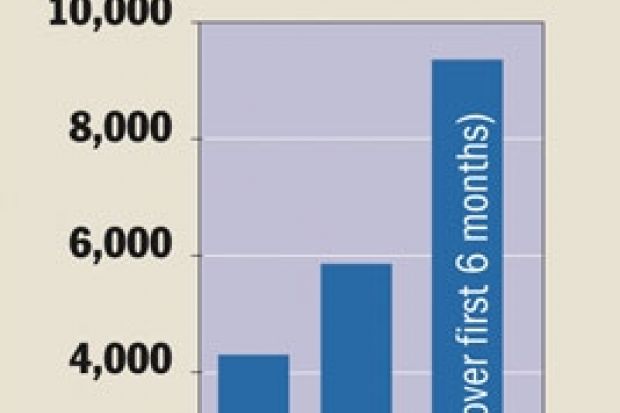The Department for Business, Innovation and Skills has introduced the checks to oversee the financial sustainability of providers seeking to have their courses "designated" in order to allow access to Student Loans Company funding by their students.
The development comes as figures presented at a recent conference by Gordon Mackenzie, deputy director of higher education funding and strategy at BIS, show that the number of students accessing publicly subsidised loans at "alternative providers" has grown from 4,300 in 2009-10 and 5,860 in 2010-11, to 9,360 in the first six months of 2011-12.
Speaking last month at the Inside Government conference on The Future of Higher Education Provision: Improving Choice, Flexibility and Quality, Mr Mackenzie added that although the total number of students at private providers was still tiny, "it is an interestingly steep rate of growth that you're beginning to see".
The government's White Paper, published last summer, had contained plans to create a "level playing field" between state-funded and non-state-funded providers, requiring the latter to be overseen by regulatory bodies such as the Quality Assurance Agency and Hefce.
At present, only 11 non-state-funded providers subscribe to the QAA.
But, as Times Higher Education went to press, there was expected to be no higher education bill in the Queen's Speech, on 9 May, which detailed all key bills scheduled to be presented in the 2012-13 session of Parliament.
According to figures from David Willetts, the universities and science minister, in response to a parliamentary question, the number of successful applications for designation granted by the government has risen from 157 in 2009-10, to 228 in 2010-11 and 395 in the first six months of 2011-12.
Responding to a separate question from Shabana Mahmood, the shadow higher education minister, Mr Willetts said that BIS first started undertaking due diligence reviews focused on financial sustainability and governance after the White Paper. He said that initially checks were undertaken on only some providers - "where initial searches identified issues of concern" - but since November 2011 this process has been expanded to all first-time applicants.
A BIS spokeswoman said the introduction of due diligence checks was "in line" with the White Paper's plan to make all private providers holding designated status subject to the same checks as state-funded universities.
Meanwhile, it is thought that ministers are considering the introduction of a draft version of a higher education bill, which could even appear in the 2012-13 session.
Some believe that a draft, subject to alteration, could allow the government to sidestep some of the battles that beset the progress of the NHS bill, which was not presented in draft form.
Register to continue
Why register?
- Registration is free and only takes a moment
- Once registered, you can read 3 articles a month
- Sign up for our newsletter
Subscribe
Or subscribe for unlimited access to:
- Unlimited access to news, views, insights & reviews
- Digital editions
- Digital access to THE’s university and college rankings analysis
Already registered or a current subscriber? Login
